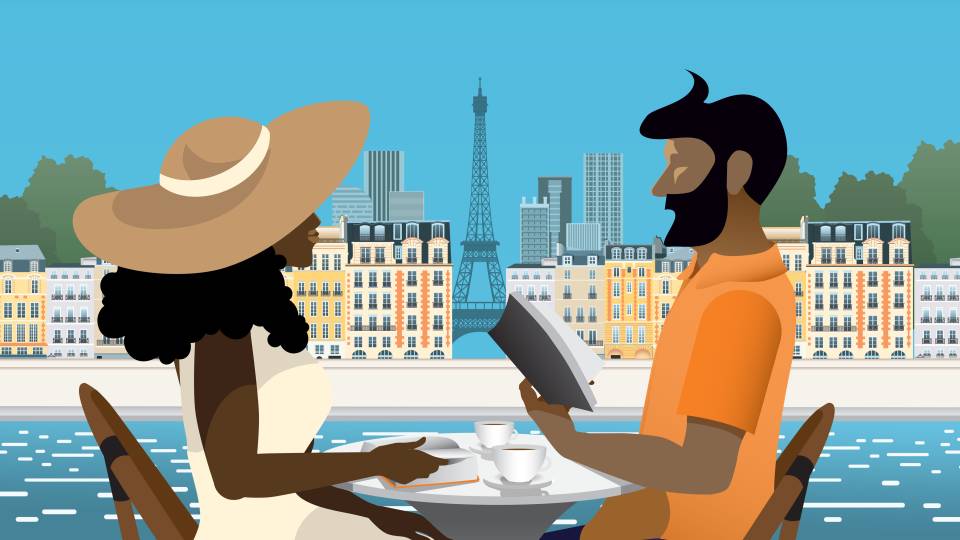Six Princeton professors talk about how the books on their shelves relate to their work and share what’s on their summer reading lists. Some book choices reflect their scholarly research and teaching. Others illuminate personal interests and current issues in the headlines, as well as books by their fellow Princeton faculty members.
Read about the professors’ choices below.

Leah Boustan, professor of economics
Leah Boustan
Tell us about a particular book on your shelf.
The book that is always on my mind — in my own research, and in my teaching — is “The Race Between Education and Technology.” The authors, Claudia Goldin and Lawrence F. Katz, were my dissertation advisers, and they taught me how to become an economist and an economic historian. I think this book is really masterful: it seeks to understand the fall and rise of income inequality in the United States over the past century using a very simple (but powerful!) framework.
Income inequality fell from around 1920 to 1980 because the American public was growing more educated, first by graduating from high school and then by going to college, producing more workers with the skills to do high-tech jobs. Yet, from 1980 to today, income inequality has been rising because education levels have been holding steady while technological change — such as computerization — has been accelerating. The book brings in a lot of careful new data collection to document trends in the income distribution and educational attainment. It’s not necessarily an easy read for the general public, but I assign sections in many of my classes and I taught a lecture distilling the ideas in my “Introductions to Microeconomics” course for the first-year students.
What’s on your summer reading list?
I have a lot of goals for summer reading — I hope I can get to all of them.
First, I am running a reading group with a few graduate students in economics who are interested in the “big picture” questions like why are some countries rich and other countries are poor? We are reading six books together, including “How the World Became Rich: The Historical Origins of Economic Growth” by Mark Koyama and Jared Rubin and “Ages of American Capitalism: A History of the United States” by Jonathan Levy.
Second, my husband (Ra’anan Boustan, a research scholar in Judaic studies at Princeton) and I are planning to read “The Social Meaning of Money: Pin Money, Paychecks, Poor Relief and Other Currencies” by Viviana Zelizer, the Lloyd Cotsen ’50 Professor of Sociology at Princeton. Ra’anan has always questioned the way that economists equate “price” with “value,” so maybe by reading this book together we can get to the bottom of this long-standing marital dispute.
Third, my Princeton colleague Ellora Derenoncourt [assistant professor of economics and the industrial relations section], gave me a novel that I am excited to dive into. It is called “The Street” by Ann Petry. The novel follows the life of Lutie Johnson, a Black single mother living and working in 1940s Harlem. Ellora thought of me because of my earlier research on the Great Black Migration. More recently, I have been working on immigration to the U.S. from Europe during the Ellis Island generation a century ago, for my new book “Streets of Gold: America’s Untold Story of Immigrant Success,” published on May 31. I am looking forward to talking to various audiences about the book this summer.
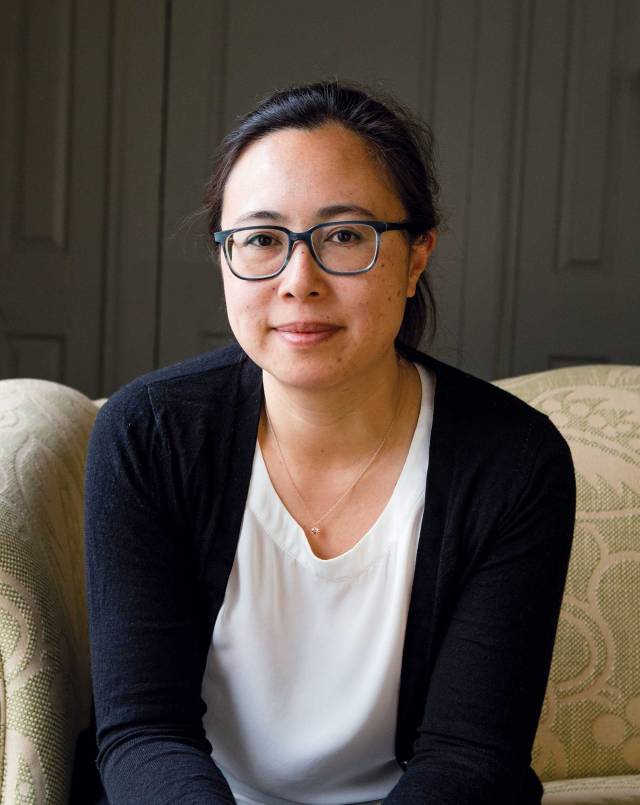
Nathalie de Leon, associate professor of electrical and computer engineering
Nathalie de Leon
Tell us about a particular book on your shelf.
My favorite books of the past decade or so are the “Three Body Problem Trilogy” (officially "Remembrance of Earth's Past") by Cixin Liu. I love these books so much that I proselytize about them at conferences and meetings. The scope of the trilogy is enormous, and I found the story so engrossing that it was hard to feel like my day-to-day decisions were very important. The books achieve what great sci-fi often reaches towards — a compelling picture of how mankind would react to something big and new. I also loved the mostly realistic depictions of scientists (the protagonist of the first book is a materials scientist!) and the multitude of deeply creative story elements.
There is an amazing scene where the characters figure out how to communicate with each other entirely in fairy tales, there is another with a depiction of a humanoid-based computer, and the author proposes what I believe is a genuinely novel solution to the Fermi Paradox. The Fermi Paradox is a question posed by Enrico Fermi, an Italian physicist (1901-1954) that asks, if the universe is so vast and old, why haven't we seen or heard from any aliens? I re-read the first two books during lockdowns a couple of years ago at the beginning of the pandemic, when escapist apocalyptic fiction seemed particularly appealing.
What’s on your summer reading list?
Our field is undergoing an interesting transition where companies are able to build complex enough quantum processors that the state of the art partly lives in industry, which forces us in academia to carefully consider how we will coexist with these efforts. On my quasi-academic reading list, I have been collecting recommendations about the history of the microelectronics industry: “Making Silicon Valley: Innovation and the Growth of High Tech, 1930-1970” by Christophe Lécuyer and “The Code: Silicon Valley and the Remaking of America” by Margaret O'Mara.
My personal reading list is entirely a reflection of my friends' recommendations because I like going into a book as cold as possible:
- “Klara and the Sun” by Kazuo Ishiguro
- “The Anomaly” by Hervé Le Tellier
- “The Power Broker: Robert Moses and the Fall of New York” by Robert Caro
- “The Dead Hand: The Untold Story of the Cold War Arms Race and Its Dangerous Legacy” by David Hoffman
- “The Love Songs of W.E.B. Du Bois” by Honorée Fanonne Jeffers
- “Call Me American” by Abdi Nor Iftin
- “The Code Breaker: Jennifer Doudna, Gene Editing and the Future of the Human Race” by Walter Isaacson
And I have a vague ambition to re-read the “Dune” trilogy by Frank Herbert because I enjoyed the 2021 movie directed by Denis Villeneuve. The last time I read them was in middle school, and I love revisiting books with new eyes.

Joshua Guild, associate professor of history and African American studies
Joshua Guild
Tell us about a particular book on your shelf.
Although I was first made aware of David Bradley’s 1981 novel “The Chaneysville Incident” by my undergraduate mentor, a literary scholar, it was not until I began my own teaching career a decade later that I finally got around to reading it. I’ve long been interested in the intersections between history, memory and race, and I was beginning to develop a course exploring these questions. Former Dean of the College Valerie Smith, then my senior colleague in the Department of African American Studies, encouraged me to check out Bradley’s novel. It was a revelation. The protagonist is a Philadelphia-based Black historian, John Washington, who is summoned back to his Western Pennsylvania hometown to care for a dying old man who had, in the absence of the historian’s deceased father, shaped and guided him as an adolescent. The protagonist’s return home becomes a multilayered reckoning with the past, including the long shadow of slavery’s violence.
The book cuts to the core of the historian’s vocation in ways that are, for me, both unsettling and liberating. Through a complex narrative that shifts between time periods, Bradley explores fundamental questions about our relationship to the past — about the gulf between what is known and what can be verified. The protagonist is forced to reconcile individual memory with family lore, local legend, and the elusive documents and ephemera that constitute the "archive." There are universal themes of truth and power and loss. But, at its core, “The Chaneysville Incident” is a beautiful meditation about the particular dynamics of African American history. As someone who spends a lot of time thinking about what it means to try to access, preserve and narrate that history — and for whom — the book really speaks to me.
What’s on your summer reading list?
Summer is all about the mix of academic and personal reading, old and new (and new to me) books. Revisiting Andy Horowitz's “Katrina: A History, 1915-2015” and “New Orleans Griot: The Tom Dent Reader,” edited by the poet and activist Kalamu ya Salaam, will help me re-immerse myself in my research on the history of contemporary New Orleans.
I also plan to go back to Nell Irvin Painter's classic “The Narrative of Hosea Hudson: The Life and Times of a Black Radical,” which offers a model for considering grassroots politics' long arc through the lens of single life.
“Becoming Abolitionists: Police, Protests and the Pursuit of Freedom” by Derecka Purnell and Davarian Baldwin's “In the Shadow of the Ivory Tower: How Universities Are Plundering Our Cities” are recent books that I'm eager to think with.
I bought journalist Dan Charnas' epic “Dilla Time: The Life and Afterlife of J Dilla, the Hip-Hop Producer Who Reinvented Rhythm” the moment it came out earlier this year but have been saving it for summer, when I could truly savor it.
I just started Ocean Vuong's remarkable novel “On Earth We're Briefly Gorgeous.”
Finally, I'm looking forward to reading novels from a couple of African writers I really admire, Maaza Mengiste's “The Shadow King” and Akwaeke Emezi's “The Death of Vivek Oji.”
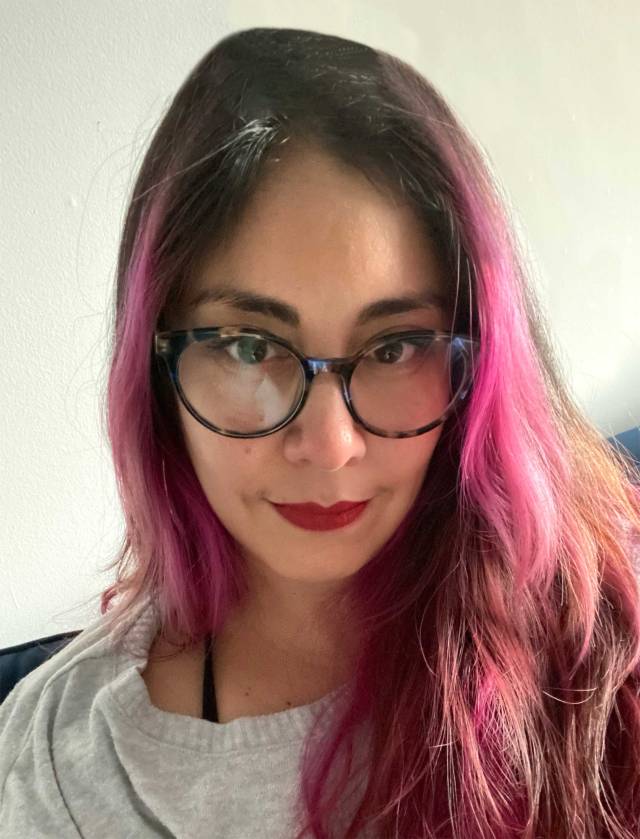
Monica Huerta, assistant professor of English and American studies
Monica Huerta
Tell us about a particular book on your shelf.
One favorite is the classic and crucial “The Alchemy of Race and Rights: Diary of a Law Professor” by the brilliant Patricia Williams. I don’t remember when I first read it, it must have been in college, but it was the first time I read a scholar analyzing — in Williams’ case — law and society from the vantage of being a Black woman and law professor, using scenes from her everyday life as a teacher, sister and writer, but also through her chance interactions with strangers.
When I was writing my book “Magical Habits” (Duke University Press, 2021), it was Williams and a longer tradition of women of color theorists like Gloria Anzaldúa, Saidiya Hartman and many, many others who helped me imagine my own book’s critical experiment about genres and knowledge from my specifically specific vantage. And in my new book “The Unintended: Photography, Property, and the Aesthetics of Racial Capitalism” (New York University Press, forthcoming 2023), I’m building on the way Williams introduced me to thinking seriously about the slipperiness of property as a concept and as an accumulation of legal protections, which is also an accumulation of uneven and unevenly told histories. In “The Unintended,” I expose a series of colonial intimacies, in Lisa Lowe’s [the Samuel Knight Professor of American Studies and Ethnicity, Race and Migration at Yale University] sense, embedded in the translation of unruly photographs and their reproductions into legal conventions for ownership and privacy in the United States at the turn of the 20th century.
What’s on your summer reading list?
Every summer, my brain-eyes are inevitably bigger than my time-stomach. I have so many Princeton colleagues who have published incredible books I want to spend slow time with, like “The Matter of Black Living: The Aesthetic Experiment of Racial Data, 1880-1930” by Autumn Womack [assistant professor of African American Studies and English] and “Black Bodies, White Gold: Art, Cotton and Commerce in the Atlantic World” by Anna Arabindan-Kesson [assistant professor of art and archaeology and African American studies]. It’s really special to do work where one of the ways we have relationships with one another is to read each other’s writing; there’s something beautiful about honoring someone’s work by spending quiet, engaged time alone with it. It’s a kind of intimacy we don’t often talk about but is an aspect I value so much about this work.
I also have books that Princeton friends and colleagues have highly recommended waiting for me on my “Things I Want to Read” shelf this summer: Paul Nadal [assistant professor of English and American studies] raved about Melissa Lozada-Oliva’s “Dreaming of You,” a novel in verse; Russ Leo [associate professor of English] sent along Stephen Graham Jones’ novel “The Only Good Indians” because he knows I’m a horror fan, and Dan-el Padilla Peralta [associate professor of classics] couldn’t say enough about Marcelo Hernandez Castillo’s memoir “Children of the Land.”
I’m also excited to read things I’m long overdue for, like Cathy Park Hong’s “Minor Feelings: An Asian American Reckoning,” Elizabeth Hinton’s “America on Fire: The Untold History of Police Violence and Black Rebellion Since the 1960s,” Robert Jones Jr.’s novel “The Prophets,” José Esteban Muñoz’s “The Sense of Brown” and the collection on American artist Carrie Mae Weems that Sarah Lewis and Christine Garnier edited.
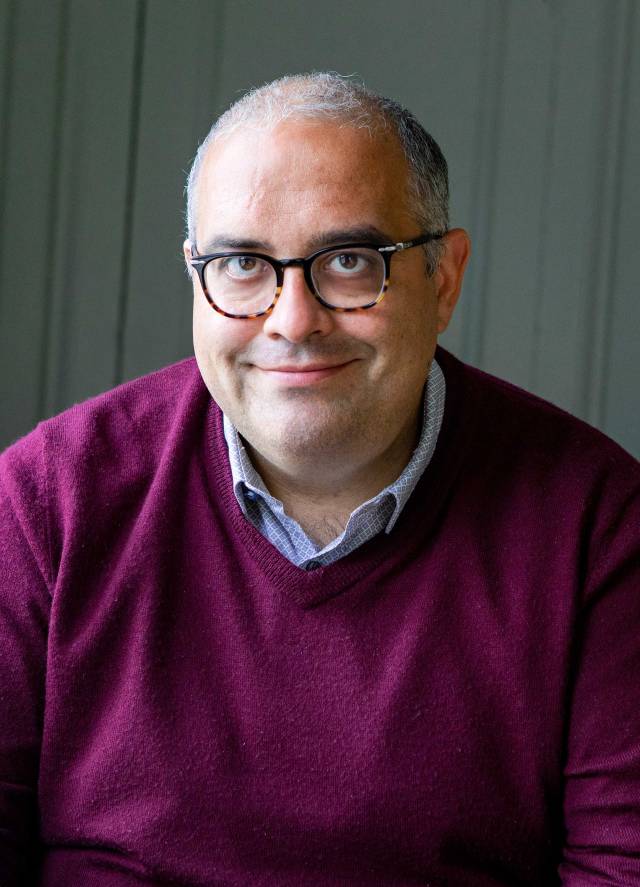
Shamus Khan, professor of sociology and American studies
Shamus Khan
Tell us about a particular book on your shelf.
Carlo Ginzburg's "The Cheese and the Worms" is a microhistory of the 16th century Friulian miller, Domenico Scandella Menocchio. He was not a famous person by any means but he was tried by the Roman Inquisition. Menocchio believed that Jesus was born a man and Mary was not a virgin, that the Pope had no power given to him from God, and that Christ had not died to redeem humanity. In his inquisition he was told to renounce his ways and adhere to the teachings of the Roman Catholic Church. He returned to his village and continued to talk about his ideas. For these ideas he was declared a heresiarch and burned at the stake.
Using inquisition records, Ginzburg traces Menocchio's life and ideas; few other archival records of his life or the world around him are available. Nonetheless Ginzburg is able to craft a beautiful portrait of something we rarely get to see: the mind and world of a medieval peasant, from his own perspective. There are no claims that Menocchio is representative — he was literate, after all.
I marvel at the range of books Menocchio drew upon to form his vision of the world: classics of Italian literature like the Decameron, the Italian translation of a book of travels attributed to Sir John Mandeville, an Italian translation of the Qur'an, and at least a dozen others. There was a world of books, circulating among men like Menocchio, that they used to make sense of their existence. Menocchio read these works and spoke about them openly.
I am writing about the history of New York, and Ginzberg’s book is a helpful reminder that the vast majority of people who have lived in that city are unknown to us. How could I do something to recover a few of their stories? It reminds me of the power of ideas, and the violence of orthodoxies. My own scholastic skepticism creeps in as well: how could Ginzburg really trust these records as authentic accounts of Menocchio's vision, rather than biased accounts with the aim toward justifying inquisition? The book is small, imperfect and beautiful. It is a tribute to the wonder of human curiosity and a reminder of the violence of intellectual conformity. There is still much we can glean from this tale of Menocchio. I like to think he would very much have liked the thought that his ideas continue to be shared among communities of the curious.
What’s on your summer reading list?
In addition to revisiting “The Cheese and the Worms” this summer, these books are on my list:
- “Elite Capture: How the Powerful Took Over Identity Politics (And Everything Else)” by Olúfẹ́mi O. Táíwò
- “Exhalation” by Ted Chiang
- “Safe Space: Gay Neighborhood History and the Politics of Violence” by Christina Hanhardt
- The “Parable” series by Octavia Butler.
Sir David MacMillan
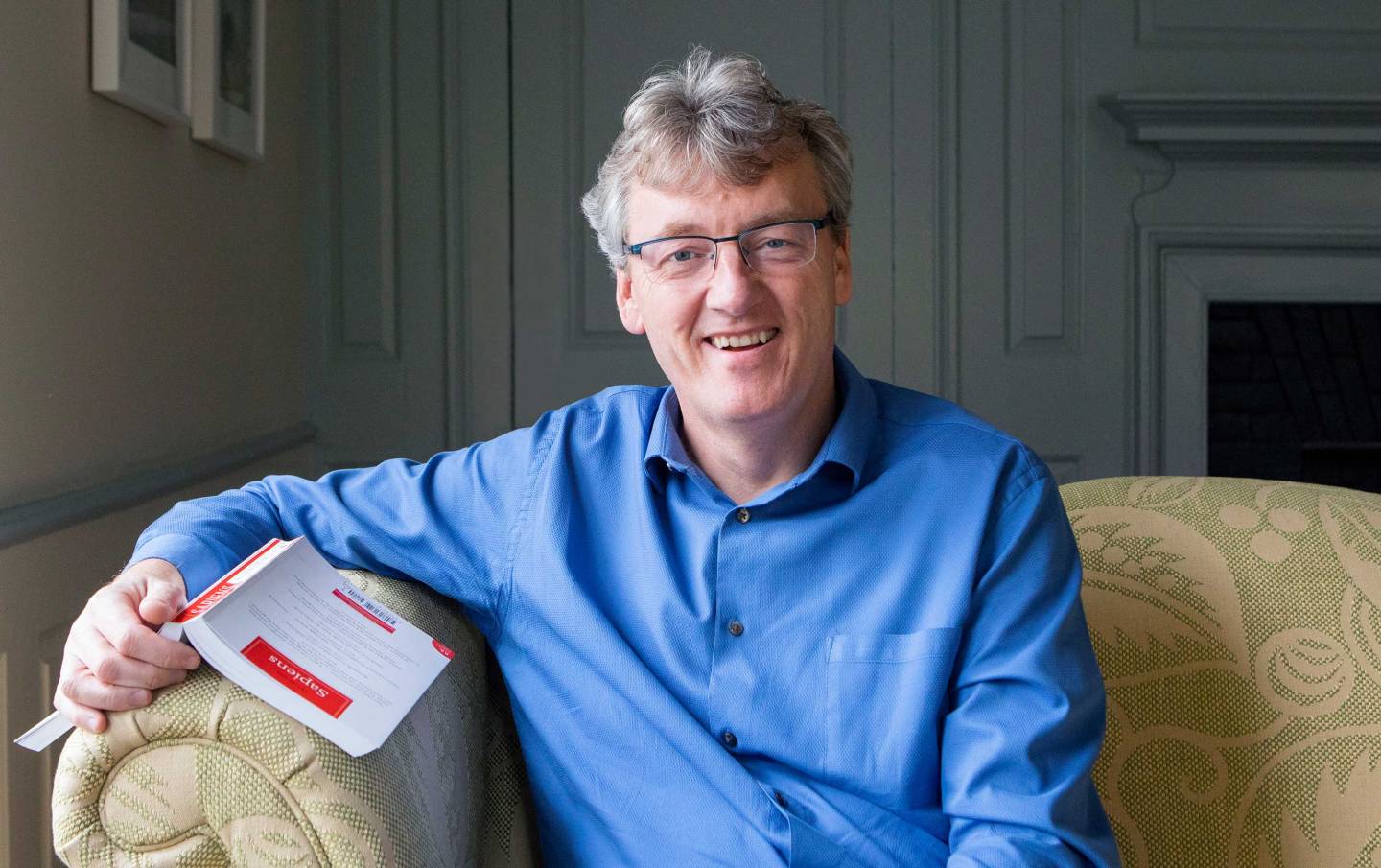
2021 Nobel Laureate in Chemistry Sir David MacMillan, the James S. McDonnell Distinguished University Professor of Chemistry
Tell us about a particular book on your shelf.
“1984” by George Orwell is an incredible book that was really about 1948 yet predicted the propaganda machines that would lead to governments enforcing authoritarian rule around the world over the next seven decades. One remarkable aspect of this is that Orwell predicted Big Brother but didn’t see coming (how could anyone) — that in the western world it would be society itself, rather than government, with the advent of social media and camera phones, but the impact was pretty similar. This is a deeply powerful book that still resonates with me every time I read it. Also, Orwell is my favorite author of all time.
What’s on your summer reading list?
“Sapiens: A Brief History of Humankind” by Yuval Noah Harari. A summer reading pick by a lot of people who seem to know what they are doing. However, a former grad student of mine (Bryon Simmons) told me I had to read it, so it’s No. 1 on the list.
“My Autobiography” by Sir Alex Ferguson. From the poverty of Govan Glasgow, Ferguson grew up on the shipyards and then went on to become a professional English football (soccer) player, then the most famous coach in the history of the game with Manchester United, from 1986 to 2013. I was fortunate to have dinner with him recently, and his stories just blew me away. An intense, hard-nosed human being, who understands people and the human condition in a way that few can. He went on to teach at Harvard Business School.
The “Aubrey-Maturin” series by Patrick O’Brien. I have read this 21-book series three times already! But it’s like painting the Golden Gate Bridge: Once you get to the end it’s time to start over again. Apart from being an amazingly accurate account of life in the British Navy in the late 18th/early 19th centuries, it’s an amazing series of stories that becomes like comfort food to insomniacs like myself.
“There Is Life After the Nobel Prize” by Eric Kandel. Sort of self-explanatory. Winning this crazy prize really does lead to your life being turned upside down in remarkable ways. Learning to live through it all is an ongoing project, but a very good friend gifted me this book, and I believe by this summer I might have the time to read it. I am also just a huge fan of Eric Kandel.
“Predictably Irrational: The Hidden Forces That Shape Our Decisions” by Dan Ariely. An older behavioral economics book but one that I have always wanted to read (and one that people constantly recommend). I loved “Thinking, Fast and Slow,” “Yes: 50 Scientifically Proven Ways to Be Persuasive,” “Outliers” and a lot of other books on understanding human psychology and the art of persuasiveness.
“1776” by David McCullough. I mainly enjoy European history but recently read “The British Are Coming: The War for America, Lexington to Princeton, 1775-1777” by Rick Atkinson, which details a lot about the Revolutionary War. I am now pretty sure that Washington camped out in what became the backyard of my house (and no one will convince me otherwise!). So, I am trying to learn as much about the Revolutionary War as possible — including more about General Mercer, who was just a remarkable soldier and physician. McCullough is an amazing author, so I am pretty sure this will be a great read and educational tour.





